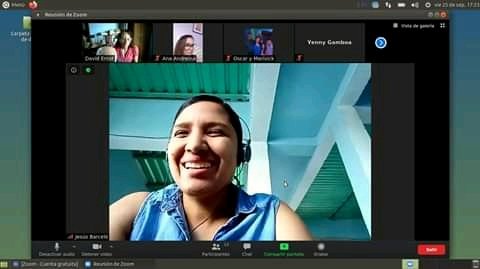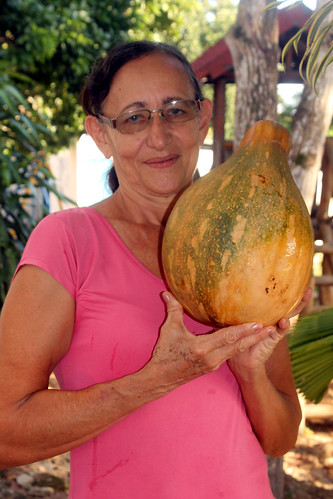July 2022 was a time of transitions for us. We closed our first school of in-person classes since 2020 and saw two former preschool students graduate from high school. Luz Maria and I took our first road trip together since 2019 for the graduation of 35 women who Luz Maria mentored for three years as deaconesses.
We were able to reopen the preschool in October 2021 under a number of restrictions. Our 25 students were split into four groups of five, each one attending two days a week. Strict sanitary procedures were required, including wearing of masks. Getting two- to three-year-old children to wear masks at all times was as easy as you might expect. This situation lasted through the fall, but after the Christmas/New Year break, all of the children were able to gather in one group each day. On July 6, we celebrated the end of the 2021/2022 school year with the children and their parents.
Our high school graduates were Yaneth Torres and Daiyamar Aranguran. Daiyamar attended our preschool until 2010, when she graduated to Virginia de Contreras Elementary School. Yaneth not only attended our preschool, but was one of the first children baptized at our mission, was later confirmed and remains a communicant member. She graduated third in her class. Yaneth’s younger sister, Diana, also attended our preschool, was baptized at our mission, and on October 31, 2021, became a communicant member. The Torres sisters both received scholarships to continue their education from LeadaChild, an Olathe, Kansas-based mission society which promotes Christian education around the world. LeadaChild has supported children in our mission since 2006. Also, Anyi Garrido, Luz Maria’s granddaughter, graduated from Virginia de Contreras and will begin high school this fall.
Deaconess formation at the end of a long road
Luz Maria and I set out across the country of Venezuela on July 7, from La Caramuca, which is closer to the Colombian border than to the capital city of Caracas, to Maturin in Monagas state, which is a nearly equal distance to the east of Caracas. We stayed the night in Caracas, then arrived in Maturin for the beginning of a final seminar for the women who had been studying to become deaconesses for three years. Together with Pastor Ángel Eliezer Montoya, director of the Juan de Frías Theological Institute, Luz Maria had guided these women in their studies, mostly online during the COVID-19 crisis. This was despite frequent lapses in electrical power and Internet service. Their graduation service was on Friday, July 22, at Cristo Rey Lutheran Church, with preaching by Pastor Sergio Fritzler of Seminario Concordia El Reformador, the Dominican Republic.
The diaconate, or “helping ministry” has its origin in the ancient church. In Acts 6 we find the apostles delegating tasks essential to the life of the church, but not to the pastoral office, to trusted laypeople. The seven men mentioned in that chapter are the first to be called “deacons”, a word which means servant. In Romans 16:1-2, St. Paul describes Phoebe of Cenchrea as a “deacon”. The word is masculine in form, but since it refers to a woman, some English translations render it as “deaconess”. Phoebe is the only woman to explicitly receive this designation, but we read of other women who held responsible positions of service in the New Testament church, including Dorcas (Acts 9:39-41), Lydia (Acts 16:14, 40) and Priscilla (Acts 18:2,18,26). In later centuries of the church, both deacon and deaconess became formal titles. The earliest reference to deaconesses outside of the New Testament is the infamous letter by Pliny the Younger, a Roman magistrate of the second century A.D., to the Emperor Trajan. In his effort to investigate the new Christian religion, Pliny mentions that he had two deaconesses tortured to find out what it was really about, but they would give no answers that satisfied Pliny. After the end of Roman persecution in the early fourth century, deaconesses would play an important role in assisting pastors and bishops. Among the classics of post-apostolic Christian literature are the 17 letters that John Chrysostom, archbishop of Constantinople from the late fourth to early fifth centuries, wrote from exile to his chief deaconess, Olympias. The letters typically begin in this way: “To the most reverend and divinely favored deaconess Olympias, I John, Bishop, send greeting in the Lord.”
While deaconesses were excluded from the pastoral office of public preaching and administration of the sacraments, their works of mercy and spiritual were was considered equal with the male diaconate. The diaconate was at first a lay ministry, but as the church developed more of a hierarchy, male deacons were elevated from the equivalent of modern lay elders to the lowest rank of the ordained clergy. The role of deaconesses was taken over by nuns, and use of the word eventually stopped.
But as early as the tenth century there flourished in Germany and Belgium the Beguine Sisterhoods, founded on the principle of fellowship and consisting of widows and unmarried girls who, without vowing perpetual chastity, led lives of prayer, meditation, and charitable ministrations. These sisters cared for orphans and the aged, went out to nurse the sick, to attend deathbeds.
The modern deaconess movement began in Kaiserswerth, Germany, in 1836, revived by Theodore Fliedner, a Lutheran pastor. Fliedner opened a hospital and a deaconess motherhouse. The Kaiserswerth-based institution of also purchased and staffed hospitals, homes, orphanages, and schools in other parts of Germany and around the world.In 1853, Johann Konrad Wilhelm Loehe opened a school for deaconesses in Neuendettelsau, Bavaria, on stricter Lutheran principles. Loehe’s school had a strong impact on deaconess programs within the Lutheran Church – Missouri Synod (LCMS).
Laying groundwork in Venezuela
Before the 2000s,
the Lutheran Church of Venezuela’s Juan de Frias Theological
Institute did not offer a deaconess program distinct from its
training of both male and female lay leaders. Two women who achieved
the highest level of theological training offered by the institute,
Luz Maria and Elsy Valladares de Machado, eventually were given the
title “deaconess” by the national church and named co-coordinators of a national deaconess program.
From 2002 to 2003, Mireya Johnson, who received her deaconess certificate is from Concordia University Chicago, and an MA in Religious Studies from Concordia Theological Seminary, Fort Wayne, Indiana, laid the groundwork for a deaconess program in Venezuela. Her husband, Dr. Ross Johnson, now director of LCMS Disaster Response and another Fort Wayne graduate, served his vicarage at La Fortaleza Lutheran Church in Maracay, Venezuela, during that time. Thanks to Mireya’s hard work and example, many young women in Maracay were moved to consider becoming deaconesses.
Deaconess Rosie Gilbert Adle in 2007 served her deaconess internship in Venezuela. She had earned a BA in Spanish from Valparaiso University in Indiana in 2003, and graduated from Concordia Seminary, St. Louis, in 2006 with an MA in deaconess studies and systematic theology. She worked with Luz Maria, Elsy and Pastor Ted Krey, now region director for Latin America and the Caribbean for LCMS World Missions, on a training program for deaconesses in Venezuela.In May, 2009, Luz Maria and Elsy traveled to Seminario Concordia, Buenos Aires, Argentina, for the first-ever conference of deaconesses throughout Latin America. In 2016, Luz Maria and I traveled with Elsy, Pastor Mendoza and his wife, Ginnatriz, to the second conference of Latin American deaconesses at the newly established Seminario Concordia El Reformador in the Dominican Republic. Although Venezuelan by birth, Ginnatriz was trained as a deaconess at the Buenos Aires seminary.
Seminario
Concordia El Reformador has committed a great deal of resources
to this program. Congratulations also are in order for deaconesses
Danelle Putnam
and Caitlin
Ramírez, who provided online instruction from the Dominican
Republic.
Meaningful memorabilia
Of the women who completed the coursework, 31 were able to attend the graduation ceremony in Maturín and four were recognized despite their absence. Those present received their certificate and several gifts, including a copy of “Un Siglo de Consagración”, collection of sermons preached at the consecration or installation of deaconesses from 1924 to 2017. The book is the excellent work of Deaconess Cheryl Dorothy Naumann from the Dominican Republic, filled with the sermons of well-known preachers in the history of the Missouri Synod. However, the most recent entries have special meaning for Luz María and me. The 30th sermon was preached on Matthew 25:31-46, October 3, 2015, by Pastor Bruce Keseman at Christ Our Savior Lutheran Church, Freeburg, Illinois, on the occasion of the commissioning of Deaconess Dorothy E.A.C. Glenn Nauman. This congregation is my mother's church and has faithfully supported our mission in La Caramuca. Pastor Keseman preached at my father's funeral in 2000 and at the funeral of my sister, Deborah, on February 26, 2022. The thirty-first sermon was preached by Pastor Theodore Krey on October 1, 2017 at the “Concordia” Lutheran Church in Palmar Arriba, the Dominican Republic, for the consecration of deaconesses Confesora Cabrera, Xiomara Cruz Pería, Carmen Helena de Santos and Elizabeth Hernández Toribio. Pastor Krey officiated the wedding of Luz María and I, on July 25, 2004, at the “La Fortaleza” Lutheran Church, in Maracay, Edo. Aragua, Venezuela. He was also one of the pastors who laid hands on me at my ordination, on December 13, 2008, in the “El Salvador” Lutheran Church, Caracas, Venezuela. Prior to my ordination, Pastor Krey preached and administered the sacraments at La Epiphany Lutheran Mission in La Caramuca.
Introduction to new Spanish hymnal
While Luz Maria and the other women were summing up what they had learned over the last three years, Pastor Fritzler was giving me and the other pastors of the Lutheran Church of Venezuela an introduction to Himnario Luterano, the new Spanish hymnal which is the fruit of 14 years of work by churches throughout Latin America with quia subscription to the Unaltered Augsburg Confession of 1530. This really deserves a newsletter to itself, but here are some preliminary observations:
Himnario Luterano looks a lot like the Lutheran Service Book: same typography, illustrations, organizational structure and numbering format. Unlike the LSB, it combines many more liturgical and devotional resources into just one book. It is intended as a multi-use volume for the home as well as public worship.
Why even a printed volume? I will not now discuss why I do not think electronic screens belong in the sanctuary in principle, but only note with the publishers of the hymnal that only about 20 percent of Lutheran congregations in Latin America even have access to screens. Certainly in La Caramuca, our Sunday service cannot depend on a constant flow of electricity.
The musical notation is written for guitar and piano. There are many who say the pipe organ is the best instrument to accompany congregational song, but pipe organs are expensive here, and it is difficult to find people who know how to play, maintain and repair them.
One too many potholes
Our journey to Maturín was without incident. However, we discovered that the roads in eastern Venezuela are in worse condition than the west, and we failed to avoid one to many potholes. A shock absorber blew out while we were only an hour’s drive west of Caracas. Thanks be to God, we were able to find a tow truck that would take us into the city and one of the women riding with us had a son who is a mechanic.
Our mission-mobile is a Volkswagen Parati Crossover, a station wagon (or “small SUV”, if you will) that was sold in North America as the VW Fox Wagon. It is named after Paraty, a city on the southern coast of Rio de Janeiro state. Volkwagen is the largest auto manufacturer in Brazil. Autoweek thinks the Parati is not up to U.S. standards, but it works for us.

















































